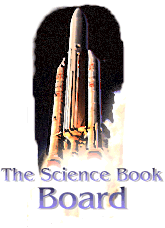 You
can purchase this book clicking here. You
can purchase this book clicking here.
If you wish to purchase
further titles already reviewed here, please return each
time to SBB. Using the direct links available
at our site is easier than searching by title, author, or
ISBN number.

EDITORIAL
INFORMATION
Dramatic advances in
ground-based and space astronomy, together with
observations of the serendipitous supernova
1987A, have led to the study of supernovae and supernova
becoming one of the most active and rewarding fields in
today's astrophysics. To take stock of these exciting
developments and to give focus to future research, the International
Astronomical Union held a colloquium in Xian, China,
for the world's leading experts and this volume gathers
together their articles.
The articles summarise our
knowledge of supernova 1987A and give the first results
on supernova 1993J. They not only demonstrate the latest
techniques for interpreting spectra and light curves of
supernovae, but show how they can be applied to measuring
the cosmic distance scale. They also cover recent
advances in theories for type I and type II supernovae,
and observations and interpretations of supernova
remnants.
(Extracted from the back cover).

GENERAL
TABLE OF CONTENTS
- -Contents.
- -Participants.
- -Preface.
- -Acknowledgements.
- -Observations of Supernovae
and the Cosmic Distance Scale.
- -Supernova Rates.
-Light Curves of Supernovae.
-Supernovae and the Cosmic Distance Scale.
-Individual Light Curve Fits of SN Ia and H0.
-Towards the Cosmic Distance Scale through
Nebular SNe Ia.
- -Type Ia Supernovae.
- -Observations of Type Ia
Supernovae.
-Type Ia Supernovae: Mechanisms and
Nucleosynthesis.
-SNIa Diversity: Theory and Diagnostics.
-Searching for Type Ia Supernova Progenitors.
-2D Simulations of Deflagrations in White Dwarfs.
-3D Simulations of Supernovae.
- -Type Ib and Type II
Supernovae.
- -Recent Advances in Supernova
Theory.
-Dynamics of Type-II Supernovae.
-Hydrodynamics and Theoretical Light Curves of
SNe II.
-Instabilities and Mixing in Type II-P and II-b
Supernovae.
-Progenitors and Hydrodynamics of Type II and Ib
Supernovae.
-Statistical Analysis of Supernovae and
Progenitors of SN Ib and SN Ic.
-Supernova Nucleosynthesis in Massive Stars.
-Nuclear Weak Processes in Presupernova Stars.
- -SN 1987A, SN 1993J, and Other
Supernovae.
- -X-Rays and Gamma-Rays from SN
1987A.
-Spectrophotometry of SN 1987A from the Kuiper
Airborne Observatory.
-Infrared Spectroscopy of SN 1987A.
-SN 1987A: Observations at Later Phases.
-Freeze out, IR-Catastrophes, and Non-thermal
Emission in SNe.
-Understanding the Nebular Spectrum of SN 1987A.
-The Oxygen 1.13 µ Fluorescence Line of SN
1987A: a Diagnostic for the Ejecta of
Hydrogen-Rich Supernovae.
-Review of Contributions to the Workshop on SN
1993J.
-A Determination of the Properties of the
Peculiar SNIa 1991T through Models of its
Early-time Spectra.
- -Supernovae and Circumstellar
Matter.
- -Radio Supernovae.
-The SN 1987A Environment.
-Radio Emission from SN 1987A.
-Interaction of Supernova Ejecta with
Circumstellar Matter and X-Ray Emission: SN 1987A
& SN 1993J.
- -Supernova Remnants.
- -Historical Supernovae and
Supernova Remnants.
-Radio Emission from Supernova Remnants.
-The Distribution of Supernova Remnants in the
Galaxy.
-Supernova Remnants in Nearby Spiral Galaxies.
-X-Ray Spectroscopy of Supernova Remnants.
-ASCA Observation of Supernova Remnants.
-Optical and UV Observations of Supernova
Remnants.
-Far-Ultraviolet Observations of Supernova
Remnants.
-Compact Objects in Supernova Remnants.
- -Catalogues.
- -A List of Supernovae
Discovered between 1989 January 1 and 1993 April
1.
-A Catalogue of Galactic Supernova Remnants.
- -List of Contributed Papers.

OUR
REVIEW
There are 41 essays in this
book, which actually is a wide compilation of the current
knowledge about supernovae and their remnants. These
essays should therefore be adequate enough both for
advanced students and for researchers. Developed by
important experts all over the world, the work contains
almost all the imaginable aspects on this question, as
well as the latest results coming from the modern
instruments nowadays available to all the specialists in
astrophysics.
Fortunately this science enjoyed
a great leap forward thanks to some recent explosions of
supernovae which are situated at relatively nearby
distances. This fact, together with the most advanced
technologies we have at the moment, has allowed us to
clarify many dark spots and take a step forward in our
understanding of such a fantastic phenomenon. We will
find this, and more, in this book, which intends to
update the objectives that have already been attained
together with those which will have to be undertaken in
the near future, as well as make them available to all
the scientific community.
|
![]()

![]()